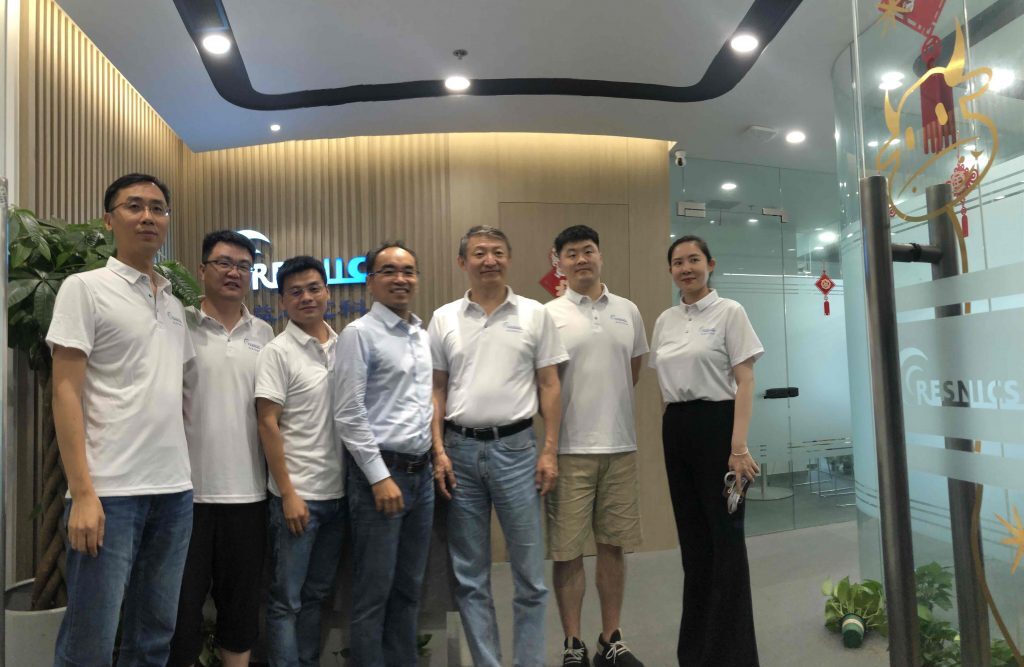
Recently, Resnics Technology, a DPU chipset startup, announced the completion of Pre-A financing. This round of financing was co-led by Oakseed Ventures and Lenovo Capital, with Grit Ventures, Oriental Fortune Capital, Dingxin Capital, FAW Lihe VC and angel investors participating. It will further accelerate Resnics Technology’s leading position in the area of smart network interface cards and DPU chips, to meet the ever increasing demands of AI and 5G on data storage and networking.
Resnics Technology will provide a full range of chips for data centers in the AI and 5G era, including DPU chips for next generation smart network interface cards (SmartNICs), computational SSD and high-end network switching chips.
“My goal is to build Asia’s NVIDIA and Broadcom, and make Resnics a semiconductor company with global influence. My starting point is building Asia’s Pensando and Fungible,” said the founder, Mr. Ronnie Huang Yiren.
DPU is the abbreviation of Data Processing Unit, and is currently regarded in the United States as the core for next-generation data centers. Pensando (founded by four senior executives of Cisco Systems with John Chambers as chairman), Fungible (founded by Juniper Networks CTO and co-founder), and NVIDIA currently compete for this market in the US. There are currently no Asian suppliers, and most Asian enterprises and Internet companies rely on imports.
Ronnie was the co-founder and CTO of silicon valley based CNEX Labs, which was backed by Dell, Cisco Systems, Microsoft, Seagate, Samsung, Micron and others. He has nearly 30 years of chip design experience, studied at Michigan Technological University in the US after graduated from Shanghai Jiaotong University. He was responsible for the architecture and design of network switching chips, SSD controllers, and SmartNICs at Cisco Systems, Sandforce and Huawei. Ronnie is the named inventor of 27 US patents, including protocols such as NVMe over Ethernet and Interlaken. For the ICs that he designed, the total number shipped has exceeded 200 million, and all the chips that Ronnie led the design of have been successful in the first tape-out.
DPUs for Composable Disaggregated Infrastructure
Internet and enterprise data centers are witnessing a major transformation. In the era of AI and 5G, the end of Moore’s Law is driving the need for heterogeneous computing. Coupled with the demands of virtualization and security, the data center must shift from a CPU-centric architecture to a Composable Disaggregated Infrastructure (CDI) architecture with DPU at the core. In this new architecture, the role of the DPU is to release the computing cycles for network switching, data storage, security and virtualization.
Oakseed Ventures Mr. Chee We Ng said: “Ronnie is a rare expert with nearly 30 years of digital chip design experience. Whether in the field of data center networks or storage, Ronnie is the absolute authority.” Chee We holds a bachelor and masters in Electrical Engineering and Computer Science from MIT. His graduate tutor was Anantha Chandrakasan, a global ultra-low-power digital chip expert and the current dean of the MIT School of Engineering. He was a graduate teaching assistant for low-power CMOS VLSI class, then served as the executive director of investments at Cisco Systems. Chee We focuses on early-stage investments in enterprise IT. Nearly half of his investments have achieved 7 to 42 times return within three to five years, with an internal rate of return (IRR) of 72 to 118%.
“Designing an enterprise chip is a non-trivial task, you can’t do it without ten to twenty years of experience. Chips are not software and cannot be iterated quickly. If bugs are discovered after tape-out, it will result in much time and money loss. Network and storage chips are extremely complex, and if the architecture or design is bad, it can easily cause deadlocks. Currently, there is a lot of VC investments in semiconductor companies, but we have seen many teams with insufficient experience raising a lot of money. The risk is very high. Ronnie’s solid product development and entrepreneurial experience in the past 30 years has addressed my many concerns. We are confident that the team led by Ronnie will not only design reliable chips, but be technologically leading globally,” Chee We added.
Ronnie, Chairman and CEO of Resnics Technology, concludes: “Thank everyone for the strong support to Resnics Technology. We will live up to your expectations to build the company into a global leader in enterprise chips. In the next few months, we will launch globally leading products and deliver them to customers. I hope that there will be more like-minded corporate partners and investors to take this journey with us to build Asia’s NVIDIA and Broadcom.”
 About Oakseed Ventures
About Oakseed Ventures
Oakseed Ventures is one of few early-stage funds that only focuses on enterprise tech. Its investment team comprises of rare technology and investment experts who have invested in enterprise IT for nearly a decade. Investment areas encompass SaaS, financial technology, AI, big data, and cloud, to infrastructure software, hardware and chips.
Founding partner Chee We Ng holds a Master’s and Bachelor’s degree in Electrical Engineering and Computer Science from MIT, an MBA from Harvard Business School, and was responsible for venture investment in China at Cisco Systems. The team’s previous investments include: Kyligence and Zilliz. Nearly half of its previous investments achieved 72-118% IRR within 3-5 years after the investment, with less than 10% of the cases requiring write-off.
Oakseed Venture’s investment philosophy is: patiently identify and invest in entrepreneurs who strive to make a distinctive contribution to enterprise tech, and accelerate growth through our network in enterprise IT, telecom operators and Internet companies.